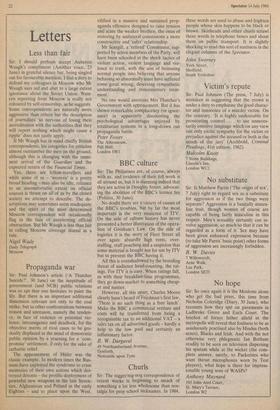Propaganda war
Sir: Paul Johnson's article ('A Thatcher Suicide?', 30 June) on the ineptitude of government (and NCB) public relations was so apt that one hesitates to paint the lily. But there is an important additional dimension relevant not only to the coal strike, but to other confrontations between reason and unreason, namely the tenden- cy, in face of violence or potential vio- lence, intransigence and deadlock, for the objective merits of rival cases to be gra- dually displaced in the mind of democratic public opinion by a yearning for a 'com- promise' settlement, if only for the sake of cathartic relief.
The appeasement of Hitler was the classic example. In modern times the Rus- sians have exploited the syndrome to erase memories of their own actions which des- troyed détente — the prolific deployment of powerful new weapons in the late Seven- ties, Afghanistan and Poland in the early Eighties — and to place upon the West, vilified in a massive and sustained prop- aganda offensive designed to raise tension and scare the weaker brethen, the onus of restoring by unilateral concessions a more constructive and 'safer' relationship.
Mr Scargill, a 'retired' Communist, sup- ported by active members of the Party, will have been schooled in the shock tactics of violent action, violent language and vio- lence to truth, with the aim of bemusing normal people into believing that anyone behaving so abnormally must have suffered some great wrong, deserving sympathetic understanding and concessionary treat- ment.
No one would associate Mrs Thatcher's Government with appeasement. But it has shown remarkable complacency (or ignor- ance) in apparently discounting the psychological advantages enjoyed by totalitarian systems in a long-drawn out propaganda battle.
Peter Foster
The Athenaeum, Pall Mall, London SWI














































 Previous page
Previous page